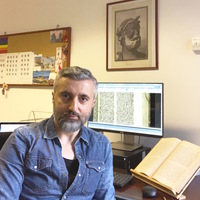
Tom Clark
President, Australasian Universities Language and Literature Association (AULLA – www.aulla.com.au) since July 2013.
Secretary-General, International Federation for Modern Language and Literature (FILLM – www.fillm.org) since July 2014.
A background in political speechwriting, studying medieval Germanic verse, and composing and publishing poems of my own has left me fascinated with the poetics of rhetoric, especially contemporary political speech. Note strong sideline interests in journalistic cliché and sports commentary, too, as well as the various bodies of theory that we can bring to bear in examining such questions.
I would be very happy to hear from any interested/potential research collaborators pursuing questions around the semiotics, grammar, or poetics of political culture, public relations, and media. That includes any graduate students who would be keen to work in Melbourne.
Phone: +61-(0)3-9919-2196
Address: Tom Clark
SCATA
Victoria University
PO Box 14428
Melbourne 8001
Australia
Secretary-General, International Federation for Modern Language and Literature (FILLM – www.fillm.org) since July 2014.
A background in political speechwriting, studying medieval Germanic verse, and composing and publishing poems of my own has left me fascinated with the poetics of rhetoric, especially contemporary political speech. Note strong sideline interests in journalistic cliché and sports commentary, too, as well as the various bodies of theory that we can bring to bear in examining such questions.
I would be very happy to hear from any interested/potential research collaborators pursuing questions around the semiotics, grammar, or poetics of political culture, public relations, and media. That includes any graduate students who would be keen to work in Melbourne.
Phone: +61-(0)3-9919-2196
Address: Tom Clark
SCATA
Victoria University
PO Box 14428
Melbourne 8001
Australia
less
Related Authors
Cristian-Nicolae Gaşpar
Central European University
Galen Strawson
The University of Texas at Austin
James Elkins
School of the Art Institute of Chicago
Javier Díaz Noci
Pompeu Fabra University
Terry Gunnell
University of Iceland
Judith Jesch
University of Nottingham
Julie Orlemanski
University of Chicago
Scott R. Stroud
The University of Texas at Austin
Marc Champagne
Kwantlen Polytechnic University
David Seamon
Kansas State University
InterestsView All (20)










Uploads
Books by Tom Clark
synthesises an argument that the poetics of Beowulf are fundamentally
contrastive. Contrastiveness is a feature of expression that enables the
presence of irony, although it does not guarantee it. Using a definition
informed principally by Liggins, this thesis argues that irony in Beowulf
consists in those instances where the poem points to the contrastive
tension between expectations or cultural paradigms, or especially
between the notional value of those on the one hand and the real world
flow of events on the other. The poem reveals its irony through many
contrastive techniques, including through the dichotomy of words and
deeds, the use of juxtaposition in its development of characters, and the
use of litotes.
This thesis devotes particular attention to manifestations of irony
that occur through the epithets of Beowulf. The epithet as a figure is
examined as both an attributive phrase and the concomitant amplification
of that phrase through its poetic context. This two-part structure makes
the epithet a likely site for irony. Close readings of the poem’s epithets
reveal many ironies and many different types of irony. Those types are
amenable to presentation as taxonomies. The systematic coherence of
those taxonomies shows that it is valid to read Beowulf as a thoroughly
ironic poem.
The argument for a thoroughgoing or systematic reading of Beowulf
as ironic is the most original contribution of this thesis. The taxonomic
approach also predisposes this thesis to present evidence that may be
useful for subsequent discussions of comedy and wordplay in Beowulf
and related fields of study.
The chapters in this volume range from the Old Testament to Facebook and from East Asia to West Africa via Australia, the Americas, and Europe. The scholarly strength forged across that range speaks to similar strengths that so many scholarly organizations devoted to studies in languages and literatures have cultivated and maintained—often in the face of government indifference or hostility towards the Humanities. Beyond Babel makes a powerful case for their potential.
The volume is divided into three sections, each engaging with worlds as malleable constructs. Central to all of the contributions is the question: how can we understand the relationships between natural, political, cultural, fictional, literary, linguistic and virtual worlds, and why does this matter?
“The poems are set after the nation’s non-Indigenous people have departed, their boats fanning out around the globe in search of asylum; the only ones left in Australia are fugitives running from a date with deportation,” Dr Clark explained.
For the Love of Regional Areas traces the last Australians’ lives, at home and abroad, in the years leading up to the Departure.
“It’s an attempt to remember what we thought we had forever: the landscapes, the distinctive sounds of Australian voices, the nation’s confidence and the platitudes that remind us why we belonged together,” he said.
Dr Clark said the collection also remembered the personal hopes and dreams of “ordinary, mainstream Australians” and celebrated their public achievements.
The collection is a timely initiative exploring the question of identity and belonging for all non-Indigenous Australians.
Dr Clark is a senior lecturer in communication at Victoria University’s School of Communication and the Arts. He is also author of Stay on Message: Poetry and Truthfulness in Political Speech.
For the Love of Regional Areas is available online as an ebook. A free, interactive version is also available as blog content.
The author devotes particular attention to the epithets of Beowulf, examined as both an attributive phrase and the concomitant amplification of that phrase through its poetic context. Close readings of the poem's epithets reveal many ironies and many different types of irony. The systematic coherence of those types shows Beowulf in a new light, as a thoroughly ironic poem.
Papers by Tom Clark
the City of Greater Dandenong partnered with Victoria University to conduct a place-based project aimed at improving responses to racism in the local community.
More specifically, this research and community engagement project sought to better understand how existing reporting and support services for people who have experienced racism can be strengthened and expanded so that they meet the specific needs and expectation of local communities in the two municipalities.
At the core of this project was the genuine commitment to listening to the voices of those in the local communities affected by racism and learning about:
• their individual experiences with racism;
• their views on reporting or not reporting
racism; and
• their suggestions about how reporting and support services can be made more accessible and empowering and better aligned with the specific needs of local communities.
This report summaries the key findings of this project, drawing on a local community survey and 11 peer-facilitated focus groups. Complemented by the input from a series
of community forums, these empirical insights guided the development of practical recommendations towards more effective anti-racism work with real-life changes in the local communities. We refer to this set of recommendation as the Casey and Greater Dandenong Roadmap.
synthesises an argument that the poetics of Beowulf are fundamentally
contrastive. Contrastiveness is a feature of expression that enables the
presence of irony, although it does not guarantee it. Using a definition
informed principally by Liggins, this thesis argues that irony in Beowulf
consists in those instances where the poem points to the contrastive
tension between expectations or cultural paradigms, or especially
between the notional value of those on the one hand and the real world
flow of events on the other. The poem reveals its irony through many
contrastive techniques, including through the dichotomy of words and
deeds, the use of juxtaposition in its development of characters, and the
use of litotes.
This thesis devotes particular attention to manifestations of irony
that occur through the epithets of Beowulf. The epithet as a figure is
examined as both an attributive phrase and the concomitant amplification
of that phrase through its poetic context. This two-part structure makes
the epithet a likely site for irony. Close readings of the poem’s epithets
reveal many ironies and many different types of irony. Those types are
amenable to presentation as taxonomies. The systematic coherence of
those taxonomies shows that it is valid to read Beowulf as a thoroughly
ironic poem.
The argument for a thoroughgoing or systematic reading of Beowulf
as ironic is the most original contribution of this thesis. The taxonomic
approach also predisposes this thesis to present evidence that may be
useful for subsequent discussions of comedy and wordplay in Beowulf
and related fields of study.
The chapters in this volume range from the Old Testament to Facebook and from East Asia to West Africa via Australia, the Americas, and Europe. The scholarly strength forged across that range speaks to similar strengths that so many scholarly organizations devoted to studies in languages and literatures have cultivated and maintained—often in the face of government indifference or hostility towards the Humanities. Beyond Babel makes a powerful case for their potential.
The volume is divided into three sections, each engaging with worlds as malleable constructs. Central to all of the contributions is the question: how can we understand the relationships between natural, political, cultural, fictional, literary, linguistic and virtual worlds, and why does this matter?
“The poems are set after the nation’s non-Indigenous people have departed, their boats fanning out around the globe in search of asylum; the only ones left in Australia are fugitives running from a date with deportation,” Dr Clark explained.
For the Love of Regional Areas traces the last Australians’ lives, at home and abroad, in the years leading up to the Departure.
“It’s an attempt to remember what we thought we had forever: the landscapes, the distinctive sounds of Australian voices, the nation’s confidence and the platitudes that remind us why we belonged together,” he said.
Dr Clark said the collection also remembered the personal hopes and dreams of “ordinary, mainstream Australians” and celebrated their public achievements.
The collection is a timely initiative exploring the question of identity and belonging for all non-Indigenous Australians.
Dr Clark is a senior lecturer in communication at Victoria University’s School of Communication and the Arts. He is also author of Stay on Message: Poetry and Truthfulness in Political Speech.
For the Love of Regional Areas is available online as an ebook. A free, interactive version is also available as blog content.
The author devotes particular attention to the epithets of Beowulf, examined as both an attributive phrase and the concomitant amplification of that phrase through its poetic context. Close readings of the poem's epithets reveal many ironies and many different types of irony. The systematic coherence of those types shows Beowulf in a new light, as a thoroughly ironic poem.
the City of Greater Dandenong partnered with Victoria University to conduct a place-based project aimed at improving responses to racism in the local community.
More specifically, this research and community engagement project sought to better understand how existing reporting and support services for people who have experienced racism can be strengthened and expanded so that they meet the specific needs and expectation of local communities in the two municipalities.
At the core of this project was the genuine commitment to listening to the voices of those in the local communities affected by racism and learning about:
• their individual experiences with racism;
• their views on reporting or not reporting
racism; and
• their suggestions about how reporting and support services can be made more accessible and empowering and better aligned with the specific needs of local communities.
This report summaries the key findings of this project, drawing on a local community survey and 11 peer-facilitated focus groups. Complemented by the input from a series
of community forums, these empirical insights guided the development of practical recommendations towards more effective anti-racism work with real-life changes in the local communities. We refer to this set of recommendation as the Casey and Greater Dandenong Roadmap.
by JRR Tolkien, edited by Christopher Tolkien
Harper Collins
288pp
19.99 AU
Published June, 2017
ISBN 9780008214210
It was a speech that changed the political landscape in relation to Aboriginal and non-Indigenous relations in Australia.
The rhetorical legacy and language of the speech offered Australia a new political discourse on Indigenous affairs as well as paved the way for the Rudd government’s apology in 2008.